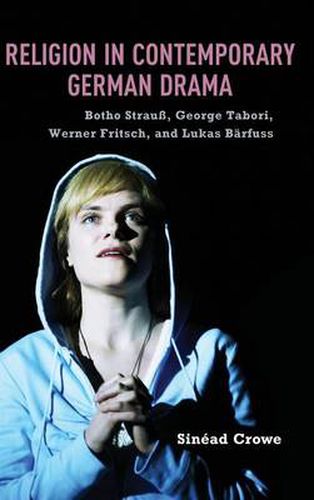Readings Newsletter
Become a Readings Member to make your shopping experience even easier.
Sign in or sign up for free!
You’re not far away from qualifying for FREE standard shipping within Australia
You’ve qualified for FREE standard shipping within Australia
The cart is loading…






Critics often claim that the twenty-first century has seen a sudden return of religion to the German stage. But although drama scholarship has largely focused on politics, postmodernity, gender, ethnicity, and postdramatic performance, religious themes, forms, and motifs have been a topic and a source of inspiration for German dramatists for several decades, as this study shows. Focusing on works by four major dramatists - Botho Strauss, George Tabori,Werner Fritsch, and Lukas Barfuss - this book examines how, why, and to what effect religion is invoked in German drama since the late 1970s. It asks whether contemporary German drama succeeds in developing religious insights or is at most quasi-religious, exploiting religious signs for aesthetic, theatrical, or dramaturgical ends. It considers the performative and historical intersections between drama and religion, contextualizing the playwrights’ treatments of religion by exploring how they lean on or repudiate the traditions of modern European drama, especially that of Strindberg, the Expressionists, Artaud, Grotowski, and Beckett. It also draws on the sociology, anthropology,and psychology of religion, exploring how these works reflect the changing place of religion and spirituality in the world, from secularization to the alternative modes of religiosity that have proliferated in Western society since the 1960s.
Sinead Crowe is a Teaching Assistant at the University of Limerick, Ireland.
$9.00 standard shipping within Australia
FREE standard shipping within Australia for orders over $100.00
Express & International shipping calculated at checkout
Critics often claim that the twenty-first century has seen a sudden return of religion to the German stage. But although drama scholarship has largely focused on politics, postmodernity, gender, ethnicity, and postdramatic performance, religious themes, forms, and motifs have been a topic and a source of inspiration for German dramatists for several decades, as this study shows. Focusing on works by four major dramatists - Botho Strauss, George Tabori,Werner Fritsch, and Lukas Barfuss - this book examines how, why, and to what effect religion is invoked in German drama since the late 1970s. It asks whether contemporary German drama succeeds in developing religious insights or is at most quasi-religious, exploiting religious signs for aesthetic, theatrical, or dramaturgical ends. It considers the performative and historical intersections between drama and religion, contextualizing the playwrights’ treatments of religion by exploring how they lean on or repudiate the traditions of modern European drama, especially that of Strindberg, the Expressionists, Artaud, Grotowski, and Beckett. It also draws on the sociology, anthropology,and psychology of religion, exploring how these works reflect the changing place of religion and spirituality in the world, from secularization to the alternative modes of religiosity that have proliferated in Western society since the 1960s.
Sinead Crowe is a Teaching Assistant at the University of Limerick, Ireland.